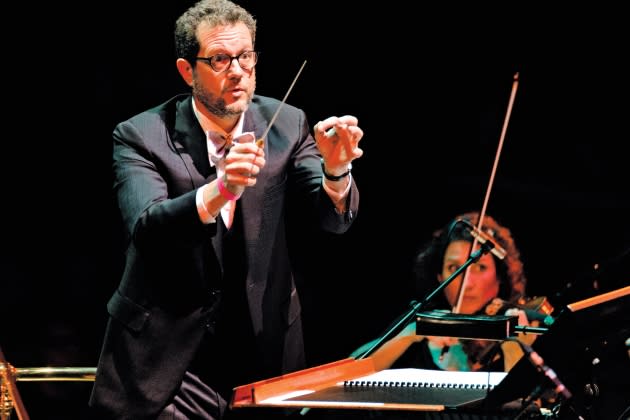‘Werewolf by Night’ Director Michael Giacchino Explains How He Convinced Kevin Feige to Let Horror Special Be in Black and White
- Oops!Something went wrong.Please try again later.
- Oops!Something went wrong.Please try again later.

Marvel fans tuning in to “Werewolf by Night” Friday on Disney+ may be surprised when they read the director’s name as the end titles roll.
It’s Michael Giacchino, who is far better known as the Oscar- and Emmy-winning composer of “Up” and “Lost,” not to mention such other high-profile, big-grossing films as “The Batman” and the last three entries in the “Spider-Man” franchise.
More from Variety
But, as Giacchino reminds us, he’s been behind the camera since he was a youngster in Edgewater Park, N.J. “I love making movies,” he says. “I’ve loved it since I was 9 years old. That’s what it was about, gathering every kid in the neighborhood and creating movies in my parents’ backyard.”
He later attended New York’s School of Visual Arts, and while his career ultimately took him into music – scoring such popular films as “The Incredibles,” two “Mission: Impossible” films, three in the “Star Trek” series and three more “Jurassic World” flicks – he always wanted to get back to his moviemaking roots.
Giacchino had already helmed two professional shorts (“Monster Challenge” and one in the “Star Trek: Short Treks” series). So when Marvel Studios President Kevin Feige offered him the chance to direct a Marvel project, Giacchino immediately suggested “Werewolf by Night,” an obscure comic from the 1970s.
“I knew it as a kid,” he says. “I still have my comics.” He also incorporated the title character from another obscure ’70s Marvel title, “Man-Thing,” in the story, something that will probably be noticed by only a handful of serious Marvel historians.
“Monster movies to me are nothing but allegories for people with problems,” Giacchino muses. “Every time I would watch ‘King Kong’ or ‘The Wolf Man,’ and everyone would be chasing them with torches, trying to kill them, I would always feel so badly for them. I’m like, ‘Guys, he doesn’t want to be doing this! He doesn’t want to be rampaging! He’s got an issue and he needs help.'”
So “Werewolf by Night” isn’t just a scare fest. An homage to 1940s horror films (like those ’70s comic books), it invites sympathy for its characters and even has a sense of humor. Giacchino especially admired 1982’s “Poltergeist” as “a film that wonderfully walked the line of heart, humor and horror. It’s not easy; you need a lot of checks and balances,” he says. “If a story keeps its sights on heart, humor and humanity, then you are free to do some crazier stuff on the fringes of that story.”
The 53-minute one-shot special is also in black-and-white. “In my mind, from the very beginning, it needed to be in black-and-white,” he says. There was skepticism from the upper echelons of Marvel, he hints, so it was filmed in color but “we had a special monitor that allowed me to see what it was going to look like” in case the monochrome plan was finally approved.
“I felt like if we were going to do something new in the Marvel Universe, let’s really do something different and bold,” Giacchino says. “Not worry about where it’s going or how it’s going to connect to something else. Let’s take the Rod Serling approach, tell a single isolated story, a night in the life of Jack (Gael Garcia Bernal) and Elsa (Laura Donnelly). That’s really what I wanted to do.”
It was on “maybe the third cut” that Feige finally agreed that “Werewolf by Night” should be in black-and-white, Giacchino reports. It is also not, he stresses, a pilot for a possible future Marvel series – although he also concedes that “anything can happen. We’ll see.”
The director scored the show too, and it ranks among his most intense musical compositions. “I never approach something from the point of view of, oh, that’s a scary scene, I’ll write some scary music. The way I approach music is, how would I feel if I were Jack or Elsa at that moment? Then I can actually write something that feels like the true emotions, what you need to tell the story.”
Giacchino has signed with CAA for his new career as a director. But his music career is far from over, and he is expected to continue as composer for his friends’ projects. “Next Goal Wins” is slated to be his next score for director Taika Waititi (for whom he has done “Jojo Rabbit” and “Thor: Love and Thunder”).
Best of Variety
Constance Wu Gets Candid in Revealing New Memoir 'Making a Scene'
The Best Pop Culture Halloween Costumes for 2022: From 'House of the Dragon' to 'Euphoria'
Sign up for Variety’s Newsletter. For the latest news, follow us on Facebook, Twitter, and Instagram.
